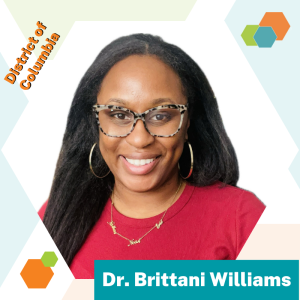Dr. Brittani Williams, a first-generation student, is a senior director of K-12 policy and advocacy at The College Board and a Fellow in the third cohort of the Postsecondary State CTE Leaders Fellowship at Advance CTE – Sponsored by ECMC Foundation.

A: I started my work in CTE on the secondary education side for the state of Louisiana, where I saw how strong CTE programming can provide students with an actual pathway to economic mobility. Not all students want to pursue 4-year degrees, but that does not preclude them from the opportunity to engage in educational options that support a successful and thriving future. Coming from a background where I had to navigate education as a first-generation student, I’ve always been passionate about breaking down barriers and building access. CTE is an avenue where I can contribute to systems that equip students, especially those from underserved communities, with the skills and credentials to thrive.
Not all students want to pursue 4-year degrees, but that does not preclude them from the opportunity to engage in educational options that support a successful and thriving future.
Q: Postsecondary access, in general, is a challenging reality for some learners in the U.S. How do you address this challenge in your current work?
A: Currently, I serve as a Senior Director of Policy, focusing on improving secondary education assessments and accountability systems to serve all students better. My work ensures that learners receive the support necessary to attain and persist successfully through higher education. Previously, as a Director of Advocacy, Policy, and Research, I led national, state, and institutional efforts to advance access for all education policy solutions.
Moreover, I focus on increasing outcomes for student advancement. I’ve worked extensively to push for data-driven solutions and holistic and culturally competent learner-focused reforms that remove systemic barriers. My work is grounded in the belief that access should not be one size fits all, but it should be malleable to accommodate all learners’ needs.
Q: You’ve been vocal about the barriers faced by postsecondary education participants who are also parents. Why do you think this is such a crucial issue?
A: I was a parenting student. I had my first child in the middle of my undergraduate career. It is the entirety of who I am to show up and advocate for support for parenting students so they can attain educational opportunities for the betterment of themselves and their children. Parenting students are often overlooked in higher education. They’re balancing caregiving and often (like I did) full-time coursework and full-time employment, yet many policies and systems aren’t designed with them in mind. I know firsthand what it’s like to be a parenting student navigating college, which is why I dedicated my dissertation to uplifting their stories.
Addressing the needs of parenting students is critical to advancing access and achieving true intergenerational mobility.
Q: You’ve spoken before about leaders being aware of and committed to intergenerational mobility, economic mobility, social capital, and human capital development. Can you share how this commitment has shaped your leadership and actions in your current role?
A: Yes! I love this question! This commitment shows up in EVERYTHING I do, from how I lead, support, and show up for my community in the field of education policy, to how I consider the needs of education reform, to how I advise students to advocate for policy change. I intentionally center on the voices of all learners and push for solutions that don’t just address immediate needs but create sustainable pathways. Whether through my Fellowship project with Advance CTE or my national, state, and institutional advocacy work, I focus on systems-level change that supports generations that will benefit from action.
My work is grounded in the belief that access should not be one size fits all, but it should be malleable to accommodate all learners’ needs.
Q: What do you see as the future of CTE and what challenges do you think need to be addressed?
A: The future of CTE is bright!! The future of CTE is a pathway welcoming all students in its ability to be inclusive, responsive, and aligned with workforce demands. One of the biggest challenges we face is ensuring that CTE isn’t seen as a “lesser than” path or the “last resort”, but rather as a high-quality, viable option for all learners. We also need to address perceived disparities in access to programs, particularly for students of color and those parenting or working full-time.
Q: You’re clearly passionate about creating long-term change. What advice would you give to others who want to make a difference in CTE and postsecondary participation and attainment?
A: Yes, I am!
- First, start by listening…. for my Fellowship project, I conducted qualitative research because I want supporters of CTE to read the stories of students engaging with postsecondary CTE programs in real-time.
- Second, build relationships across systems, stay grounded in data and lived experiences, and be willing to challenge the status quo (be good trouble).
- Third, learn to wait well — be reminded that progress takes time, but consistent action that centers policies and practices that ensure all learners have access to high-quality CTE programs matters. Last, and (in my opinion) most importantly, don’t underestimate your lived experience as a tool for change. My own journey has shaped not just my career, but the lens through which I lead.
Q: As a participant in Advance CTE’s national Fellowship, what do you hope to gain from this experience?
A: I hope to strengthen my ability to drive change within state systems and build lasting networks with other leaders focused on ensuring equal access for all learners. The fellowship gives me space to grow my leadership while designing a project that has a real-world impact. I’m excited to continue bridging policy, research, and advocacy to support more equal and accessible CTE systems.
Brittani’s journey to CTE leadership is a testimony of two core principles in achieving excellence regardless of obstacles: resilience and persistence. Her insights are just one example of the incredible work being done by the fellows of the Advance CTE National Fellowship. To learn more about Brittani and other inspiring state leadership Fellows, visit the Postsecondary State CTE Leaders Fellowship page, where you can discover how to build intentional support systems for the success of all learners.
If you are interested in launching a CTE Leadership Fellowship in your state please contact Dr. Kevin R. Johnson Sr. at [email protected].

